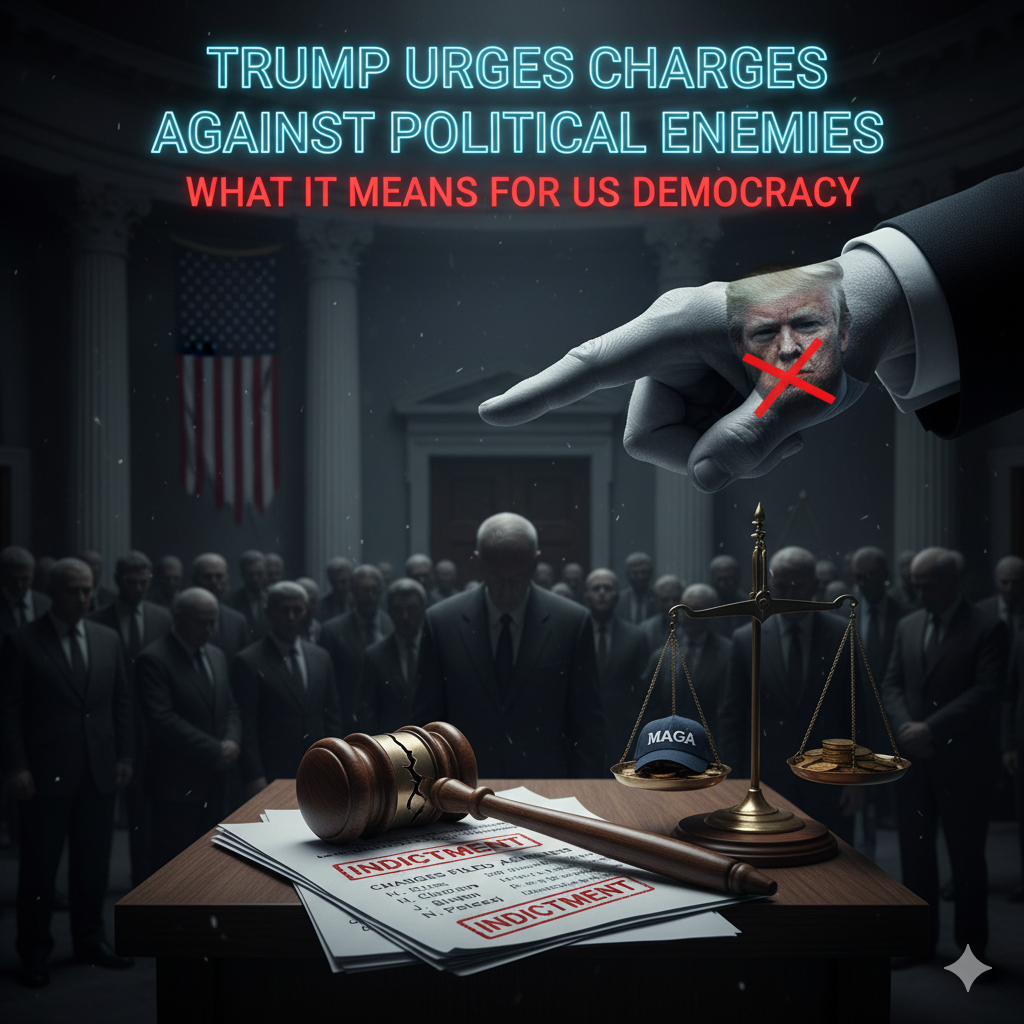Introduction: A Troubling Call from the White House
In a move that has reignited debates about the politicization of justice in the United States, President Donald Trump publicly urged his Justice Department to bring charges against his political rivals. This demand, made in a televised speech and echoed on social media, has sparked widespread criticism from legal experts, civil rights groups, and even some within his own party.
At its core, the issue is not simply about partisan rivalry but about the very foundation of American democracy: the independence of the judiciary and the principle that no leader should wield law enforcement as a weapon against opponents.
Background: Trump’s History with the Justice Department
This is not the first time Trump has clashed with the Justice Department. During his previous presidency, he frequently criticized officials who resisted his efforts to direct investigations. From complaints about the Russia probe to demands for probes into Joe Biden and Hillary Clinton, Trump has often blurred the line between political grievances and legal processes.
However, his latest remarks are particularly stark. By openly calling for charges against political adversaries, Trump has elevated concerns that his administration could erode institutional safeguards designed to keep the justice system impartial.
The Core of the Controversy: Independence Under Threat
In the American political system, the Justice Department is expected to operate independently, even though it is part of the executive branch. Prosecutors and investigators are bound by law, not political orders. Trump’s appeal to transform the DOJ into a tool for punishing critics represents, according to constitutional scholars, an alarming breach of norms.
Legal experts argue that such pressure undermines both domestic trust in the justice system and America’s global reputation as a nation that champions rule of law.
Reactions from Across the Political Spectrum
Trump’s call has triggered a flurry of reactions:
- Democrats quickly condemned the remarks as authoritarian and dangerous. Senate Majority Leader Chuck Schumer warned that “weaponizing justice sets America on a path toward dictatorship.”
- Republicans remain divided. Hardline Trump allies defended the comments as a response to what they see as politically motivated investigations into Trump himself. But moderate conservatives expressed unease, with Senator Mitt Romney stating, “No president should dictate who gets charged — that is the essence of tyranny.”
- Civil rights groups such as the ACLU stressed that such rhetoric risks encouraging abuses of power, especially against activists and journalists critical of the administration.
Global Repercussions: America’s Image on Trial
The controversy is not confined to US borders. International observers, already critical of America’s political polarization, see Trump’s remarks as a signal of democratic backsliding. European allies expressed concern, with Germany’s foreign minister stating that “the independence of justice must remain inviolable in any democracy.”
Authoritarian regimes, however, may use this moment to justify their own politicized prosecutions, arguing that if the US can do it, so can they. This undermines America’s ability to promote democratic norms abroad.
Historical Parallels: Lessons from the Past
History offers stark warnings about the dangers of politicizing justice. In countries where leaders have used courts to target opponents — from Russia to Turkey — the result has often been a slide into authoritarianism. America’s founders, mindful of such risks, enshrined the separation of powers to prevent a president from becoming judge, jury, and executioner.
Legal historians note that even in times of crisis, such as the Nixon administration, the Justice Department ultimately resisted attempts to become a political weapon. Whether Trump’s DOJ will uphold that tradition remains a pressing question.
The Legal Perspective: Can Trump Order Charges?
Technically, the president cannot directly prosecute individuals. Only the Justice Department, through its prosecutors and investigative agencies, has that authority. However, as head of the executive branch, the president wields immense influence over DOJ leadership.
If Trump pressures his attorney general or replaces them with loyalists willing to carry out political directives, the practical effect could be the same as issuing direct orders. This possibility underscores why critics describe his remarks as both dangerous and destabilizing.
Impact on the 2024 Election and Beyond
Trump’s remarks also carry major political implications. For his supporters, the demand for charges against rivals plays into a narrative that the system is “rigged” against him, fueling populist anger and energizing his base. For opponents, it reinforces fears that another Trump presidency could threaten democratic institutions.
Independent voters — often the deciding factor in elections — may view this rhetoric as a step too far, raising doubts about Trump’s commitment to democratic norms. Analysts suggest that this controversy could become a defining issue in the 2024 election campaign.
The Human Cost: Chilling Effects on Dissent
Beyond the headlines, Trump’s call for prosecutions could have a chilling effect on free speech and dissent. If political opponents, activists, or journalists fear being targeted by law enforcement simply for criticizing the government, the space for open debate shrinks.
Democracy thrives on disagreement and accountability. Without the assurance that justice is impartial, citizens may grow fearful of engaging in civic life, eroding the democratic fabric from within.
What Happens Next?
Much depends on how the Justice Department responds. Attorney General officials have not yet issued a formal statement, but insiders suggest growing tension within the department. If the DOJ resists Trump’s demands, it risks political retaliation. If it complies, it risks destroying its credibility.
Congress, too, may play a role in providing oversight, though partisan divisions make any unified response unlikely. Ultimately, the resilience of America’s institutions will be tested in how they balance political pressure against constitutional duty.
Conclusion: Democracy at a Crossroads
Trump’s public call for charges against his political enemies is more than a headline; it is a stress test for American democracy. At stake is the independence of the justice system, the principle of equal treatment under the law, and the credibility of the United States as a global defender of democratic values.
The road ahead is uncertain. If institutions hold firm, this moment may be remembered as a crisis weathered. If they falter, it could mark the beginning of a dangerous new era in which justice bends to politics.
The world is watching. And so are the American people, whose trust in their democracy hangs in the balance.







